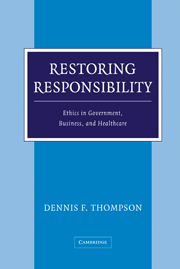Book contents
- Frontmatter
- Contents
- Acknowledgments
- Restoring Responsibility
- Introduction: The Need for Institutional Responsibility
- PART I DEMANDS OF INSTITUTIONAL POLITICS
- 1 The Problem of Many Hands
- 2 The Responsibility of Advisers
- 3 Bureaucracy and Democracy
- 4 Judicial Responsibility
- 5 Representatives in the Welfare State
- PART II VARIETIES OF INSTITUTIONAL FAILURE
- Part III EXTENSIONS OF INSTITUTIONAL RESPONSIBILITY
- Credits
- Index
5 - Representatives in the Welfare State
Published online by Cambridge University Press: 29 January 2010
- Frontmatter
- Contents
- Acknowledgments
- Restoring Responsibility
- Introduction: The Need for Institutional Responsibility
- PART I DEMANDS OF INSTITUTIONAL POLITICS
- 1 The Problem of Many Hands
- 2 The Responsibility of Advisers
- 3 Bureaucracy and Democracy
- 4 Judicial Responsibility
- 5 Representatives in the Welfare State
- PART II VARIETIES OF INSTITUTIONAL FAILURE
- Part III EXTENSIONS OF INSTITUTIONAL RESPONSIBILITY
- Credits
- Index
Summary
If the we lf are state is to be democratic, the legislators who make its policies must be responsible to the citizens who are affected by them. Responsibility requires that legislators explain their actions to the citizens they represent. Giving reasons is part of what being responsible means, and part of what being reelected requires.1 But the nature of welfare itself poses a dilemma for democratic responsibility. To justify decisions about welfare, representatives must consider the preferences of citizens. But those preferences at any particular time are not adequate grounds for a justification of welfare policy. Orthodox theories of representation provide no way to cope with this problem; a satisfactory theory must take a different approach. Instead of looking for justifications solely in the preferences of citizens at a particular time, we should look at the legislative process in which the justifications are made.
Welfare policy, more than most other kinds, is grounded in the preferences of citizens. The reasons that representatives give for other kinds of policies, such as civil rights or cultural development, should not follow preferences so closely. When justifying these policies, representatives might not count some preferences as reasons at all (those based on racial prejudice, for example), and might regard other reasons as decisive (those based on individual rights or ideals of excellence). But when welfare is in question, what citizens say should count for more. Citizens may be mistaken about their own welfare, but at some point they must be taken as competent judges of it.
Information
- Type
- Chapter
- Information
- Restoring ResponsibilityEthics in Government, Business, and Healthcare, pp. 99 - 126Publisher: Cambridge University PressPrint publication year: 2004
